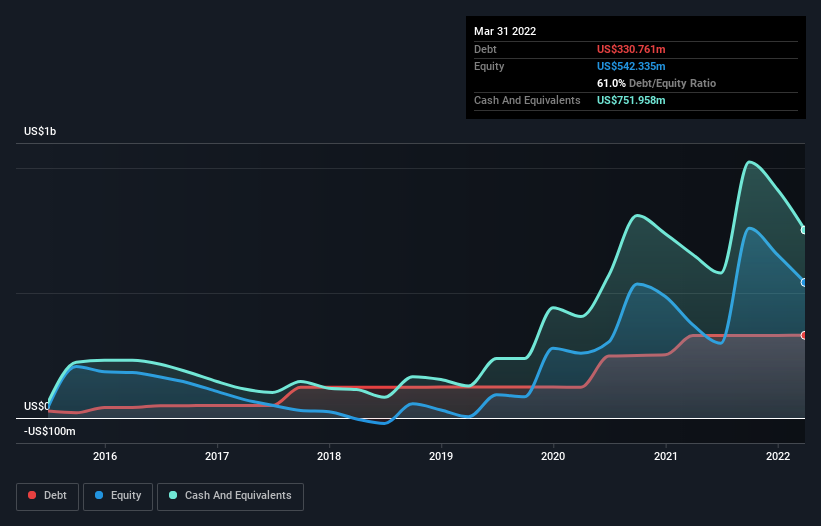
Legendary fund manager Li Lu (who Charlie Munger backed) once said, 'The biggest investment risk is not the volatility of prices, but whether you will suffer a permanent loss of capital.' It's only natural to consider a company's balance sheet when you examine how risky it is, since debt is often involved when a business collapses. Importantly, Natera, Inc. (NASDAQ:NTRA) does carry debt. But the real question is whether this debt is making the company risky.
Why Does Debt Bring Risk?
Generally speaking, debt only becomes a real problem when a company can't easily pay it off, either by raising capital or with its own cash flow. If things get really bad, the lenders can take control of the business. While that is not too common, we often do see indebted companies permanently diluting shareholders because lenders force them to raise capital at a distressed price. Of course, plenty of companies use debt to fund growth, without any negative consequences. When we think about a company's use of debt, we first look at cash and debt together.
See our latest analysis for Natera
What Is Natera's Debt?
The chart below, which you can click on for greater detail, shows that Natera had US$330.8m in debt in March 2022; about the same as the year before. However, it does have US$752.0m in cash offsetting this, leading to net cash of US$421.2m.

A Look At Natera's Liabilities
According to the last reported balance sheet, Natera had liabilities of US$231.1m due within 12 months, and liabilities of US$371.3m due beyond 12 months. Offsetting these obligations, it had cash of US$752.0m as well as receivables valued at US$167.9m due within 12 months. So it actually has US$317.5m more liquid assets than total liabilities.
This surplus suggests that Natera has a conservative balance sheet, and could probably eliminate its debt without much difficulty. Succinctly put, Natera boasts net cash, so it's fair to say it does not have a heavy debt load! The balance sheet is clearly the area to focus on when you are analysing debt. But it is future earnings, more than anything, that will determine Natera's ability to maintain a healthy balance sheet going forward. So if you're focused on the future you can check out this free report showing analyst profit forecasts.
In the last year Natera wasn't profitable at an EBIT level, but managed to grow its revenue by 49%, to US$667m. Shareholders probably have their fingers crossed that it can grow its way to profits.
So How Risky Is Natera?
We have no doubt that loss making companies are, in general, riskier than profitable ones. And the fact is that over the last twelve months Natera lost money at the earnings before interest and tax (EBIT) line. And over the same period it saw negative free cash outflow of US$453m and booked a US$546m accounting loss. But the saving grace is the US$421.2m on the balance sheet. That kitty means the company can keep spending for growth for at least two years, at current rates. Natera's revenue growth shone bright over the last year, so it may well be in a position to turn a profit in due course. Pre-profit companies are often risky, but they can also offer great rewards. When analysing debt levels, the balance sheet is the obvious place to start. But ultimately, every company can contain risks that exist outside of the balance sheet. Be aware that Natera is showing 3 warning signs in our investment analysis , you should know about...
If, after all that, you're more interested in a fast growing company with a rock-solid balance sheet, then check out our list of net cash growth stocks without delay.
Valuation is complex, but we're here to simplify it.
Discover if Natera might be undervalued or overvalued with our detailed analysis, featuring fair value estimates, potential risks, dividends, insider trades, and its financial condition.
Access Free AnalysisHave feedback on this article? Concerned about the content? Get in touch with us directly. Alternatively, email editorial-team (at) simplywallst.com.
This article by Simply Wall St is general in nature. We provide commentary based on historical data and analyst forecasts only using an unbiased methodology and our articles are not intended to be financial advice. It does not constitute a recommendation to buy or sell any stock, and does not take account of your objectives, or your financial situation. We aim to bring you long-term focused analysis driven by fundamental data. Note that our analysis may not factor in the latest price-sensitive company announcements or qualitative material. Simply Wall St has no position in any stocks mentioned.
About NasdaqGS:NTRA
Natera
A diagnostics company, provides molecular testing services worldwide.
Flawless balance sheet with reasonable growth potential.
Similar Companies
Market Insights
Community Narratives



